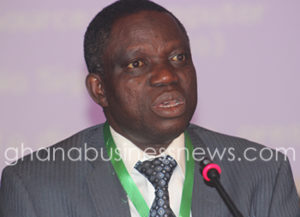Trade facilitation would tackle ECOWAS trade integration barriers

Dr Gbenga Greg Obideyi, Director of Trade at the Economic Community of West African States (ECOWAS), has expressed the need for increased trade facilitation to deal with the barriers to trade integration in the sub-region.
He said lack of trade facilitation is a major problem to low levels of regional trade in the sub-region and its integration into the global trade system.
Dr Obideyi was speaking at the opening of a two-day workshop on “Unlocking Transit Challenges Across Trade Corridors in West Africa,” organised by the World Bank in Partnership with ECOWAS under its ‘Improved and Facilitated Trade in West Africa Project’ in Accra.
He said compared to other regional blocs ECOWAS, has recorded persistent low levels of from 10 to 14 per cent intra-regional trade since its inception in 1975 while the European Union, North America Free Trade Agreement and the South American economic organisation; Mercosur, recorded intra-regional trade from 65-70 per cent.
He said the solution to issues related to intra-regional trade, including tariff and non-tariff barriers, is to increase trade facilitation, which involves reducing the financial costs of clearing goods, reducing the time spent in clearing goods and removing disharmonies in customs practices.
He noted that the region has not been able to achieve its aim of being integrated into the multilateral trading system due to poor trade facilitation in the region, and urged participants, particularly stakeholders who are directly affected to be frank in their assessments and contributions to the workshop.
He expressed dissatisfaction about the lack of political willingness on the part of authorities to implement the protocols, decisions and agreements that they sign in a bid to address the issues.
Some of the decisions, protocols and agreements such as the ECOWAS Trade Liberalisation Scheme, which allows citizens of member states to move freely between member countries with their goods without barriers or tariffs.
Others are the ECOWAS protocol/supplementary protocol on free movement of persons, residence and establishment, ECOWAS Convention on inter-State road transportation and Convention on mutual administrative assistance on customs matters.
These agreements and conventions still remain on paper due to the lack of political will by the member states to implement them and technical people not doing what they were supposed to do.
“We want to walk the talk. Whatever commitments we make here, we as ECOWAS Commission, I, as Director of Trade and my colleague the director of customs, intend to ensure that we follow up on the decisions we reach here with actions by reaching to authorities in members states, political leaders for action.”
Ronke Amoni-Ogunsulire, International Finance Corporation (IFC) Country Manager for Ghana, Benin, Burkina Faso, Niger and Togo, said West African countries have enormous potential to strengthen competitiveness and increase trade flows, which can drive growth reduce poverty and deliver jobs to the region.
She noted that regional corridors are important trade arteries and facilitating trade along those corridors are vital for improving the trade environment in the region, especially in light of ECOWAS’ ambitious policy to increase intra-regional trade from 12 to 14 per cent by 2030.
Participants at the two-day workshop, drawn from Ghana, Cote d’Ivoire, Burkina Faso, Benin and Niger represent three important trade corridors: Tema- Ouagadougou, Abidjan-Ouagadougou and Niamey-Cotonou, and have agreed to collaborate in implementing reforms that would remove the barriers to trade and transit along those corridors.
Ms Ogunsulire said the World Bank recognises the importance of trade in reducing poverty and boosting shared prosperity and in making the region more competitive to help grow the countries.
Mr Salifou Tiemtore, Director of Customs of the ECOWAS Commission said trade facilitation is largely a customs issue with one of the biggest problems being transit; taking goods from one country to another.
He expressed the need for cooperation among Customs authorities of member states.
“We need to find good instruments for cooperation between Customs to facilitate the movement of goods between countries,” he said.
He proposed a possible inter-connectivity of the customs system of the various countries, which would allow the sharing of real-time information between Customs and eliminate some of the checks that cause delays on the corridor.
He said work had started on putting such a system in place, with Burkina Faso and Cote d’Ivoire schedule to run a pilot, which would add Mali and Senegal, with support of some development partners.
The Improved and Facilitated Trade in West Africa Project is a 3.5 million Euro, four-year initiative launched in 2014 to support ECOWAS to improve trade in the region, especially transit trade along major trade corridors.
Funded by the European Union, the project seeks to reduce the time and cost to trade and increase border agency cooperation and coordination in order to encourage better flow of goods within the region and with international trade partners.
Source: GNA
